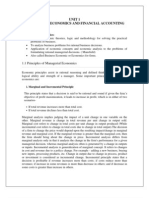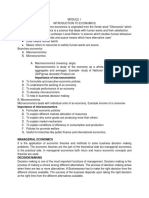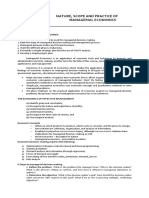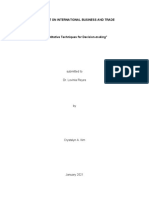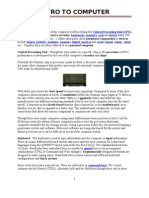Unit - 1 Basics of Managerial Ecnomics LESSON 5-Tools and Technique of Decision Making
Unit - 1 Basics of Managerial Ecnomics LESSON 5-Tools and Technique of Decision Making
Uploaded by
umeshk1Copyright:
Available Formats
Unit - 1 Basics of Managerial Ecnomics LESSON 5-Tools and Technique of Decision Making
Unit - 1 Basics of Managerial Ecnomics LESSON 5-Tools and Technique of Decision Making
Uploaded by
umeshk1Original Title
Copyright
Available Formats
Share this document
Did you find this document useful?
Is this content inappropriate?
Copyright:
Available Formats
Unit - 1 Basics of Managerial Ecnomics LESSON 5-Tools and Technique of Decision Making
Unit - 1 Basics of Managerial Ecnomics LESSON 5-Tools and Technique of Decision Making
Uploaded by
umeshk1Copyright:
Available Formats
UNIT -1
BASICS OF MANAGERIAL ECNOMICS
LESSON 5- Tools and Technique of Decision Making
So this is the last lesson of this Unit i.e. Unit – 1.
After doing this lesson you will be able to know the various tools and techniques of
decision making. How these tools and technique are useful for managers in making the
right decision.
But before knowing the tools and technique of decision making can you
answer some of my questions:
• Is decision making a process?
• Are there any particular steps required for decision making?
• Is decision making depends on the condition or situations?
• What are the various conditions affecting decision making?
o.k.
Fine, tell me why decision making is required?
See we all know we have unlimited wants, and the means to satisfy those wants are
very limited. We have to make choices. We cannot have whatever we want. We have
to make preferences amongst our choices. And we will prefer those thing first which
is most needed. Therefore our choice depends on our need. What we need the most is
to be chosen first.
Factors influencing managerial decision:
Now its clear that managerial decision making
is influenced not only by economics but also by several other significant considerations.
While economic analysis contributes a great deal to problem solving in an enterprises it is
important to remember that three other variable also influences the choices and decision
made by the managers. These are as follows:
Human and behavioral considerations
Technological forces
Environmental factors.
Steps in decision making:
there are certain things which are to be taken into account while
making decisions. No matter what’s the size of the problem but like every thing decision
making should also be in certain steps.
Following are the various steps in decision making:
• Establish objectives
• Specify the decision problem
• Identify the alternatives
• Evaluate alternatives
• Select the best alternatives
• Implement the decision
• Monitor the performance
Business decision making is essentially a process of selecting the best out of alternative
opportunities open to the firm. The above steps put managers analytical ability to test and
determine the appropriateness and validity of decisions in the modern business world.
Modern business conditions are changing so fast and becoming so competitive and
complex that personal business sense, intuition and experience alone are not sufficient to
make appropriate business decisions.
It is in this area of decision making that economic theories and tools of economic analysis
contribute a great deal.
Application of economic tools:
For e.g.
A firm plans to launch a new product for which close substitutes are available in
the market. One method of deciding whether or not to launch the product is to
obtain the services of the business consultants or to seek expert opinions. If the
matter has to be decided by the managers of the firms, two areas which they need
to know:
• Production related issues
• Sales prospects and problems
Basic economic tools in managerial economics for decision making:
Economic theory offers a
variety of concepts and analytical tools which can be of considerable assistance to the
managers in his decision making practice. These tools are helpful for managers in solving
their business related problems. These tools are taken as guide in making decision.
Following are the basic economic tools for decision making:
1) Opportunity cost
2) Incremental principle
3) Principle of the time perspective
4) Discounting principle
5) Equi-marginal principle
1) Opportunity cost principle:
By the opportunity cost of a decision is meant the
sacrifice of alternatives required by that decision.
For e.g.
a) The opportunity cost of the funds employed in one’s own business is the interest
that could be earned on those funds if they have been employed in other ventures.
b) The opportunity cost of using a machine to produce one product is the earnings
forgone which would have been possible from other products.
c) The opportunity cost of holding Rs. 1000as cash in hand for one year is the 10%
rate of interest, which would have been earned had the money been kept as fixed
deposit in bank.
Its clear now that opportunity cost requires ascertainment of sacrifices. If a decision
involves no sacrifices, its opportunity cost is nil.
For decision making opportunity costs are the only relevant costs.
2) Incremental principle:
It is related to the marginal cost and marginal revenues, for
economic theory. Incremental concept involves estimating the impact of decision
alternatives on costs and revenue, emphasizing the changes in total cost and total
revenue resulting from changes in prices, products, procedures, investments or
whatever may be at stake in the decisions.
The two basic components of incremental reasoning are
1) Incremental cost
2) Incremental Revenue
The incremental principle may be stated as under :
“ A decision is obviously a profitable one if –
a) it increases revenue more than costs
b) it decreases some costs to a greater extent than it increases others
c) it increases some revenues more than it decreases others and
d) it reduces cost more than revenues”
3) Principle of Time Perspective
Managerial economists are also concerned with the short run and the long run
effects of decisions on revenues as well as costs. The very important problem in
decision making is to maintain the right balance between the long run and short
run considerations.
For example,(illustration)
Suppose there is a firm with a temporary idle capacity. An order for 5000 units
comes to management’s attention. The customer is willing to pay Rs 4/- unit or
Rs.20000/- for the whole lot but not more. The short run incremental
cost(ignoring the fixed cost) is only Rs.3/-. There fore the contribution to
overhead and profit is Rs.1/- per unit (Rs.5000/- for the lot)
Analysis:
From the above example the following long run repercussion of the order
is to be taken into account :
1) If the management commits itself with too much of business at lower
price or with a small contribution it will not have sufficient capacity to
take up business with higher contribution.
2) If the other customers come to know about this low price, they may
demand a similar low price. Such customers may complain of being
treated unfairly and feel discriminated against.
In the above example it is therefore important to give due consideration to the time
perspectives. “ a decision should take into account both the short run and long run effects
on revenues and costs and maintain the right balance between long run and short run
perspective”.
4) Discounting Principle :
One of the fundamental ideas in Economics is that a rupee tomorrow is worth less than a
rupee today. Suppose a person is offered a choice to make between a gift of Rs.100/-
today or Rs.100/- next year. Naturally he will chose Rs.100/- today. This is true for two
reasons-
i) the future is uncertain and there may be uncertainty in getting Rs. 100/- if the
present opportunity is not availed of
ii) 2) even if he is sure to receive the gift in future, today’s Rs.100/- can be
invested so as to earn interest say as 8% so that one year after Rs.100/- will
become 108
5) Equi - marginal Principle:
This principle deals with the allocation of an available resource among the alternative
activities. According to this principle, an input should be so allocated that the value added
by the last unit is the same in all cases. This generalization is called the equi-marginal
principle.
Suppose, a firm has 100 units of labor at its disposal. The firm is engaged in four
activities which need labors services, viz, A,B,C and D. it can enhance any one of these
activities by adding more labor but only at the cost of other activities.
FURTHER READINGS:
1) MANAGERIAL ECONOMICS : By: R.L VARSHNEY
K.L MAHESHWARI
2) MANAGERIAL ECONOMICS : By: H. CRAIG PETERSON
W. CRIS LEWIS
You might also like
- Managerial Economics and Strategy: Third EditionDocument17 pagesManagerial Economics and Strategy: Third EditionNanthakumar SubramanianNo ratings yet
- PDF Created With Pdffactory Pro Trial VersionDocument11 pagesPDF Created With Pdffactory Pro Trial VersionK venkata ramana71% (14)
- Two Marks Questions and Answers: 1. What Is Managerial Economics?Document28 pagesTwo Marks Questions and Answers: 1. What Is Managerial Economics?Selvam Raj100% (2)
- Ir7105 Service ManualDocument735 pagesIr7105 Service ManualChenna VijayNo ratings yet
- But Before Knowing The Tools and Technique of Decision Making Can You Answer Some of My QuestionsDocument15 pagesBut Before Knowing The Tools and Technique of Decision Making Can You Answer Some of My QuestionssiddhaerhNo ratings yet
- What Do You Think of This Page?Document26 pagesWhat Do You Think of This Page?gunjanjainghsNo ratings yet
- Eco 2Document4 pagesEco 2mehaik patwa , 20No ratings yet
- Engineering Economics Course NotesDocument14 pagesEngineering Economics Course NotesBharath Sankar0% (1)
- Basic Tools of Managerial Economics For Decision MakingDocument20 pagesBasic Tools of Managerial Economics For Decision MakingPrayag rajNo ratings yet
- Unit 4 Module 7 Decision MakingDocument18 pagesUnit 4 Module 7 Decision MakingJem100% (1)
- Notes On Managerial EconomicsDocument28 pagesNotes On Managerial EconomicsShantilal HajeriNo ratings yet
- Decision Making EnvironmentDocument8 pagesDecision Making EnvironmentJessie Dela FuenteNo ratings yet
- Chapter V: Relevant Information and Decision MakingDocument37 pagesChapter V: Relevant Information and Decision MakingBereket DesalegnNo ratings yet
- Tools of MEDocument24 pagesTools of MEHaritha IduriNo ratings yet
- AsnaqachDocument10 pagesAsnaqachTeshomeNo ratings yet
- Managerial Economics Unit 1Document82 pagesManagerial Economics Unit 1Anand KumarNo ratings yet
- Module 1pbd 4 The SemDocument6 pagesModule 1pbd 4 The Semhisarahhh4No ratings yet
- PBD Exam OrientedDocument16 pagesPBD Exam OrientedManaveNo ratings yet
- Chapter 14 DECISION MAKING, RELEVANT COSTS & BENEFITSDocument6 pagesChapter 14 DECISION MAKING, RELEVANT COSTS & BENEFITSPadit TmvsNo ratings yet
- Unit:-1 MB-106: Managerial Economics By:-Manoj Kumar GautamDocument42 pagesUnit:-1 MB-106: Managerial Economics By:-Manoj Kumar GautamPiyush ChaturvediNo ratings yet
- Material No. 5Document5 pagesMaterial No. 5rhbqztqbzyNo ratings yet
- Managerial Eco ReviewerDocument24 pagesManagerial Eco ReviewerLuis VillaroyaNo ratings yet
- Managerial Accounting - Decision Making: Relevant Costs & BenefitsDocument8 pagesManagerial Accounting - Decision Making: Relevant Costs & Benefitstinku221No ratings yet
- AMD Full NotesDocument40 pagesAMD Full Notesshaheenn502No ratings yet
- Definition of Managerial EconomicsDocument6 pagesDefinition of Managerial EconomicsHarish AroraNo ratings yet
- Hweco515Document6 pagesHweco515Kunal KinsuNo ratings yet
- Decision Making .PPT 4th Sem McomDocument16 pagesDecision Making .PPT 4th Sem Mcomnousheen rehmanNo ratings yet
- Chapter 1 and 2 Managerial EcoDocument85 pagesChapter 1 and 2 Managerial Ecodine62611No ratings yet
- Chapter OneDocument37 pagesChapter Onehamdi abdrhmanNo ratings yet
- ME - Nature, Scope A ImportanceDocument40 pagesME - Nature, Scope A ImportancePrayag rajNo ratings yet
- BE Decision MakingDocument17 pagesBE Decision Makingguest956271No ratings yet
- Chapter 1 PDFDocument4 pagesChapter 1 PDFKarrie SandersNo ratings yet
- Nature, Scope and Practice of Managerial Economics - Fb4b0cd5f16d2e5ad31128574223fDocument4 pagesNature, Scope and Practice of Managerial Economics - Fb4b0cd5f16d2e5ad31128574223fJet jet GonzalesNo ratings yet
- Cost 2Document11 pagesCost 2Hawi BerhanuNo ratings yet
- Economics As A Tool For Decision MakingDocument7 pagesEconomics As A Tool For Decision MakingArpan ChatterjeeNo ratings yet
- Business EconomicsDocument65 pagesBusiness EconomicsFitha FathimaNo ratings yet
- Role of Managerial Economics in Decision MakingDocument2 pagesRole of Managerial Economics in Decision MakingFatimah TariqNo ratings yet
- Terms EconDocument5 pagesTerms EconKylaeunice GuerraNo ratings yet
- Eng'g Man 2Document18 pagesEng'g Man 2airabernabeee101No ratings yet
- Basic Concepts of Managerial EconomicsDocument6 pagesBasic Concepts of Managerial EconomicsAnika VarkeyNo ratings yet
- EconomicsDocument6 pagesEconomicsidealNo ratings yet
- 14 Bbma3203 T10 PDFDocument27 pages14 Bbma3203 T10 PDFHarianti HattaNo ratings yet
- Decision Making NewDocument11 pagesDecision Making NewDawit AmahaNo ratings yet
- Decision Making NewDocument10 pagesDecision Making NewDawit AmahaNo ratings yet
- Managerial Acc ProjectDocument6 pagesManagerial Acc Projectsamer abou saadNo ratings yet
- Chapter 1 MEDocument38 pagesChapter 1 MEanimut silesheNo ratings yet
- Cost II - CH - 2-Decision MakingDocument9 pagesCost II - CH - 2-Decision MakingYitera SisayNo ratings yet
- Managerial EconomicsDocument13 pagesManagerial EconomicsaromoishaNo ratings yet
- Decision Making - BlablaDocument46 pagesDecision Making - BlablaNortom SilencerNo ratings yet
- Risk ManagementDocument22 pagesRisk ManagementPaw AdanNo ratings yet
- Econ Analysis Introduction 201516 1Document42 pagesEcon Analysis Introduction 201516 1Mohd Abidi NoranizahNo ratings yet
- Quantitative Techniques For Decision-MakingDocument18 pagesQuantitative Techniques For Decision-MakingIlim Crystel Anne A.No ratings yet
- Managerial Economics Chapter OneDocument11 pagesManagerial Economics Chapter OneSamsonNo ratings yet
- 1 Introduction To Managerial EconomicsDocument25 pages1 Introduction To Managerial EconomicsgaoiranallyNo ratings yet
- Module 1: Fundamentals of Economics, Management and Managerial EconomicsDocument10 pagesModule 1: Fundamentals of Economics, Management and Managerial EconomicsmichelleNo ratings yet
- Lecturer-16 - Assessment of Economic Viability, Decision Making, Expected CostsDocument26 pagesLecturer-16 - Assessment of Economic Viability, Decision Making, Expected Costsaakash srivastavaNo ratings yet
- Lesson 1Document34 pagesLesson 1AGRAWAL UTKARSHNo ratings yet
- Ch-5 CostDocument24 pagesCh-5 Costmubarek oumerNo ratings yet
- LEAN ENTERPRISE: Transforming Organizations Through Agile Principles and Continuous Improvement (2023 Guide for Beginners)From EverandLEAN ENTERPRISE: Transforming Organizations Through Agile Principles and Continuous Improvement (2023 Guide for Beginners)No ratings yet
- Atienza Vs Board of Medicine G.R. No. 177407.Document4 pagesAtienza Vs Board of Medicine G.R. No. 177407.Soc SaballaNo ratings yet
- Tut - 12648 - Static and Fatigue Structural Test TutorialDocument5 pagesTut - 12648 - Static and Fatigue Structural Test TutorialTeoTyJayNo ratings yet
- Chap 02Document15 pagesChap 02Tanvirul AlamNo ratings yet
- Internship Report LiskoDocument32 pagesInternship Report LiskoMuhammad Ramiz Amin100% (1)
- OnlinecvDocument3 pagesOnlinecvapi-283127937No ratings yet
- Tablas para Identificacion de Las EnterobacteriasDocument31 pagesTablas para Identificacion de Las EnterobacteriasMauricio VidalNo ratings yet
- Semantics PaperDocument12 pagesSemantics PaperAmalia AftahNo ratings yet
- The Travel Retailer of The Future Research PaperDocument20 pagesThe Travel Retailer of The Future Research Paperfernanda romanoNo ratings yet
- EmbirdManual PDFDocument358 pagesEmbirdManual PDFUjang Muhamad HidayatulohNo ratings yet
- BlackBox Eclipse FlyerDocument1 pageBlackBox Eclipse FlyerPeter KabwenaNo ratings yet
- HomeworkDocument12 pagesHomeworkDương Đức TríNo ratings yet
- Extra Notes English Plus TwoDocument90 pagesExtra Notes English Plus TwoMaya DeepakNo ratings yet
- Idle Mode BehaviorDocument12 pagesIdle Mode BehaviorwayanNo ratings yet
- Haydnsuniversal00haydgoog DjvuDocument2,113 pagesHaydnsuniversal00haydgoog DjvuMarcelo PassosNo ratings yet
- Screen Reader Users, Click Here To Turn Off Google Instant.: VideosDocument4 pagesScreen Reader Users, Click Here To Turn Off Google Instant.: VideosIsmailMatzNo ratings yet
- 29 1 PDFDocument4 pages29 1 PDFhburitiNo ratings yet
- Kriteria Pentaksiran Persembahan PowerpointDocument4 pagesKriteria Pentaksiran Persembahan PowerpointNoraidah JohariNo ratings yet
- Communication in NursingDocument18 pagesCommunication in NursingCeal MitchellNo ratings yet
- Englisch Analyse (Hoffentlich Die Letzte)Document2 pagesEnglisch Analyse (Hoffentlich Die Letzte)Elyas NazmiyeNo ratings yet
- Table of Specifications in Mathematics 4Document7 pagesTable of Specifications in Mathematics 4Maria Reca Ligue SantaceraNo ratings yet
- American Revolution EssayDocument8 pagesAmerican Revolution Essaylwfdwwwhd100% (2)
- EF3e Preint Filetest 06b Answer Sheet PDFDocument1 pageEF3e Preint Filetest 06b Answer Sheet PDFDiego Real Torres NinaNo ratings yet
- DFIT Analysis ExplainedDocument5 pagesDFIT Analysis Explainednova adriansyahNo ratings yet
- ECE 171 Digital Circuits: Prof. Mark G. Faust Maseeh College of Engineering and Computer ScienceDocument38 pagesECE 171 Digital Circuits: Prof. Mark G. Faust Maseeh College of Engineering and Computer ScienceMinh HoangNo ratings yet
- Intro To Computer HardwareDocument50 pagesIntro To Computer HardwareDlove JoeNo ratings yet
- Aec Ffs Process DocumentationDocument133 pagesAec Ffs Process DocumentationAnand MajumderNo ratings yet
- Rancangan Pengajaran Harian B. InggerisDocument1 pageRancangan Pengajaran Harian B. InggerisrajaNo ratings yet
- Superlatives Superlatives: Grammar Dictation Grammar DictationDocument1 pageSuperlatives Superlatives: Grammar Dictation Grammar DictationTrân NguyễnNo ratings yet







